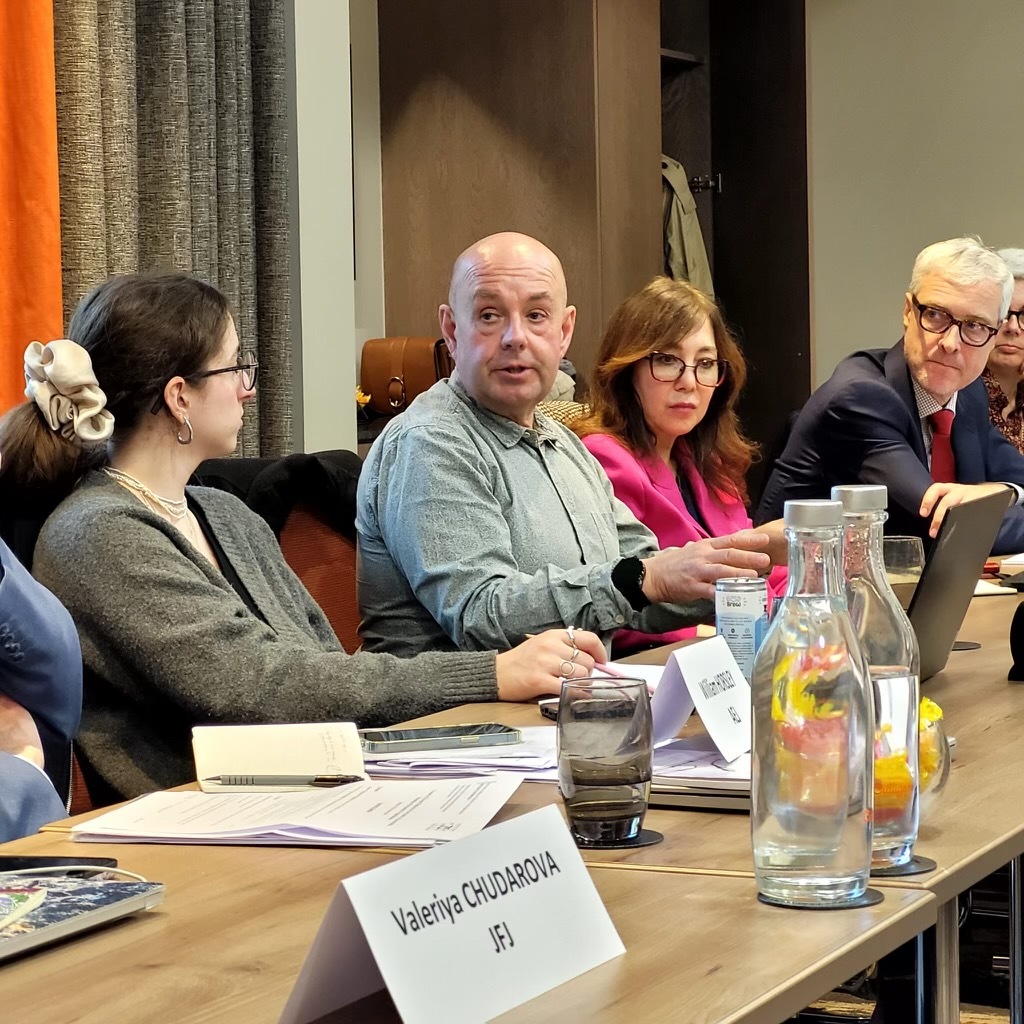In a historic ruling on December 17, a special British legal tribunal made a significant judgment for press freedom and exposed unlawful police surveillance powers in Northern Ireland.
The UK High Court’s Investigatory Powers Tribunal ruled in favour of two Belfast journalists – Barry McCaffrey and Trevor Birney – and against two UK police forces that secretly pursued them – spying on their communications, colleagues and suspected sources.
The Investigatory Powers Tribunal (IPT) is the only British court with the power to rule on covert surveillance operations carried out by the intelligence agencies and police.
In October the AEJ and ten other organisations concerned with press freedom met Barry McCaffrey in Dublin, and afterwards voiced public concerns about the allegations of large-scale surveillance of journalists in England and Northern Ireland to identify confidential sources which came to light during hearings of the UK Investigatory Powers Tribunal.
William Horsley, AEJ International media freedom representative and UK chairman, called the IPT judgment “a signal success for press freedom and an important exposé of the workings of the UK state”.
The IPT hearing and ruling came from claims by McCaffrey and Birney of unlawful police actions over their investigation of police actions in the murder of six civilians in June 1994 while watching a football match in a pub in Loughinisland, Northern Ireland. The two journalists produced a documentary film No Stone Unturned about the victims and their families and also examined the police investigation into the murders – for which no one has yet been charged.
The film names the murder suspects and highlights allegations of collusion between the police and the gunmen.
The film premiered at the New York Film Festival in September 2017 and has been broadcast by RTE the Irish public service broadcaster.
After the IPT ruling, Index on Censorship issued the following statement:
IPT exposes police abuse of power and journalists call for public inquiry
Two Belfast journalists have made British legal history today as the Investigatory Powers Tribunal ruled against two UK police forces that secretly pursued them – spying on their communications, colleagues and suspected sources.
Three police forces have been involved in this legal case – the Police Service of Northern Ireland, the Metropolitan Police Service and Durham Constabulary. Durham police were acting on behalf of the PSNI when two journalists were arrested as part of a criminal investigation in 2018. The judgment issued today has ruled against the PSNI and the Met.
For the past six years Trevor Birney and Barry McCaffrey have been embroiled in multiple, complex legal battles with the authorities because they pushed back against attacks on press freedom in the UK.
The pair were targeted by the authorities simply because they uncovered the truth about police collusion in human rights abuses in Northern Ireland. Today’s ruling is the second time that senior judges have vindicated the journalists and their work in the public interest.
The High Court in Belfast in 2019 quashed the arrest warrants.
We believe today is the first time that the IPT has ever quashed a Direct Surveillance Authorisation.
The ruling endorses the legal right of journalists to protect their sources.
The Investigatory Powers Tribunal today has quashed the PSNI’s Direct Surveillance Authorisation targeting the journalists and their suspected source. The ruling goes further to say that simply declaring the authorisation was unlawful would not be sufficient.
Today’s ruling is the first time that the Investigatory Powers Tribunal has ordered a police force to pay damages to journalists for unlawful intrusion. This unprecedented move strengthens the legal rights of all journalists.
The Investigatory Powers Tribunal is the only British court with the power to rule on covert surveillance operations carried out by the intelligence agencies and police. The judgment today ends the legal investigations into the multiple spying operations targeting Trevor Birney and Barry McCaffrey.
The ruling strengthens media protections against direct physical surveillance.
The tribunal has been highly critical of the former PSNI Chief Constable Sir George Hamilton. The tribunal has ruled he had unlawfully approved an undercover surveillance operation against a civilian employee at the Police Ombudsman’s Office (PONI).
The tribunal heard that Hamilton signed a Directed Surveillance Authorisation (DSA) after being advised that the Police Ombudsman official was the suspected source supplying secret intelligence documents to journalists. The documents were featured in the award winning 2017 documentary film ‘No Stone Unturned’. The film revealed how the police had colluded in protecting loyalist paramilitaries who murdered six unarmed civilians in the village of Loughinisland in June 1994.
Police arrested Trevor Birney and Barry McCaffrey in dramatic early morning raids on 31 August 2018 and the journalists were accused of theft and threatened with breaching the Official Secrets Act. When the journalists were released on bail later that evening, the police had already mounted a covert surveillance operation that was physically tracking the Police Ombudsman official as the suspected leaker. The intention was to set a trap that would expose the source and rearrest the journalists.
In the written judgment published this morning, the tribunal judges have rejected police claims that the surveillance operation had only been designed to target the Police Ombudsman official. If the police had confessed, in their application for approval, that the real reason for the surveillance operation was to unmask a confidential journalistic source – then they would have been refused lawful permission to go ahead.
During the tribunal hearing in October at the Royal Courts of Justice in London, the PSNI’s lawyers denied there has been a cynical attempt to deliberately circumvent the long-established legal protections for journalists and their sources.
The written judgment today describes former PSNI Chief Constable Sir George Hamilton’s decision to authorise the directed surveillance operation as “unlawful at common law” and that it violated the European Convention on Human Rights (ECHR) and the Human Rights Act 1998.
The tribunal judges have ruled that the former Chief Constable had failed to meet the legal standard necessary to justify spying on journalists and he had neglected the need for heightened scrutiny of surveillance applications in cases involving journalists. The actions of police when mounting the covert sting operation were also disproportionate and undermined the domestic and international protections available for the media.
The ruling identifies police spied on other media including BBC journalists.
Trevor Birney and Barry McCaffrey submitted a complaint to the Investigatory Powers Tribunal in 2019. The complaint was focused on potential secret police activity associated with their arrests in 2018. However, when the tribunal looked at the complaint, they uncovered secret police activity targeting various Northern Ireland journalists spanning more than a decade. The full extent of this surveillance may never come to light.
The tribunal revealed how the Metropolitan Police, acting on behalf of the PSNI, had unlawfully obtained telephone data belonging to Barry McCaffrey and the then BBC journalist Vincent Kearney in 2012. This illegally obtained data was subsequently and unlawfully shared with the PSNI and Durham Constabulary when Trevor Birney and Barry McCaffrey were arrested.
Further disclosures at the tribunal revealed that the Metropolitan Police, again acting on behalf of the PSNI, obtained more than 4,000 text messages and phone communications belonging to Trevor Birney, Barry McCaffrey and more than a dozen journalists working for BBC Northern Ireland’s investigative TV programme Spotlight.
During the tribunal, the BBC submitted a legal request to join Trevor Birney and Barry McCaffrey’s complaint. This request was brought to a dramatic and abrupt end following secret submissions made by MI5. This happened during one of the tribunal’s secret hearings in London. It remains unclear when, or if, this unlawful surveillance of BBC journalists will ever be looked at again by the tribunal.
The tribunal found police targeted Barry McCaffrey long before his arrest.
The IPT has ruled that the Met police unlawfully put Barry McCaffrey under surveillance in 2012. When the Met police subsequently passed this information on to the PSNI and Durham Police this was also unlawful. Separately, the tribunal has ruled that surveillance by the PSNI targeting Barry McCaffrey in 2013 was unlawful. The tribunal has ruled that the police breached his Article 8 and Article 10 rights under the European Convention (ECHR).
The PSNI have admitted unlawfully accessing Barry McCaffrey’s mobile phone records for three weeks in September 2013. The tribunal heard that Barry McCaffrey was put under covert electronic surveillance after he made a phone call to PSNI press office. This call related to a tip off for a story about alleged bribery payments made to a senior PSNI official by an employment agency supplying civilian personnel to the police.
Disclosures at the tribunal showed that the PSNI application to access Barry McCaffrey’s phone records admitted this would expose sensitive journalistic information to the police. The official police documents reveal how Barry McCaffrey was repeatedly described as a “suspect” who associated with “other criminal suspects”.
Reaction to the judgment
Welcoming the IPT judgment, Trevor Birney said: “This landmark ruling underscores the crucial importance of protecting press freedom and confidential journalistic sources. I hope that our judgment today will help to protect and embolden other journalists pursuing stories that are in the public interest.
“The judgment serves as a warning that unlawful state surveillance targeting the media cannot and should not be justified by broad and vague police claims. The judgment raises serious concerns about police abuse of power and the law. Our case has exposed the lack of effective legal safeguards governing secret police operations.
“As a result of our case going to the Investigatory Powers Tribunal, the PSNI has already been forced to admit that they spied on 300 journalists and 500 lawyers in Northern Ireland. Only a public inquiry can properly investigate the full extent of unlawful and systemic police spying operations targeting journalists, lawyers and human rights defenders in the North.”
Insisting that the IPT judgment reinforced the urgent need for increased legal safeguards to protect journalists and their sources, Barry McCaffrey said:
“This ruling marks a significant victory for press freedom, and it has exposed critical failures in both the monitoring and oversight of surveillance operations carried out against journalists and their sources.
“Despite all of their efforts, the police were still unable to identify our sources for the film. They wasted police time and resources going after us instead of the Loughinisland killers.
“The judgment, particularly its condemnation of Sir George Hamilton’s leadership, highlights the urgent need for reform. The police need to change, they should respect press freedom, they must abide by the rule of law and uphold the democratic principles of transparency and accountability.”
A witness statement made by Detective Superintendent Brian Foster, from PSNI Anti Corruption Unit, was submitted to the Investigatory Powers Tribunal in May 2024. The statement suggests that UK police forces regard journalists as the biggest police corrupters.
Since its formation in 2001 the IPT has conducted 4,073 investigations into complaints made against the intelligence agencies and police surveillance units. It has only upheld 1% (47) of those complaints.
The Tribunal judgment has ordered the PSNI to pay £4,000 each in damages to Trevor Birney and Barry McCaffrey— this figure is similar to previous financial damages granted by the European Court of Human Rights to journalists Dirk Ernst and Natalia Sedletska after Belgian and Ukrainian authorities were found to have breached their Article 10 rights to protect journalistic sources.
END OF INDEX ON CENSORSHIP STATEMENT

Index on Censorship background notes:
On 10 July 2020 the High Court in Northern Ireland quashed the search warrants. The judges state: “We see no overriding requirement in the public interest which could have justified interference with the protection of journalistic sources in this case.” The application before a judge for the search warrants fell “woefully short of the standards required to ensure it was fair”.
On 16 July 2020 the PSNI Chief Constable Simon Byrne apologised for the unlawful arrests of Trevor Birney and Barry McCaffrey.
2020 Northern Ireland High Court judicial review – on National Union of Journalists website
On 5 June 2024, the Northern Ireland Policing Board published the report showing the PSNI has admitted that over the past 14 years it has applied for the phone records of more than 320 Northern Ireland journalists and 500 lawyers. The PSNI did not listen in to phone calls, but they obtained details of everyone journalists and lawyers had spoken to on the phone, when they made the calls, and how often they spoke. The data would also have included a record of the location of mobile phones, showing where a phone – and its owner – was at any point in time.
Northern Ireland Policing Board report on phone call records
On 5 June 2024, the PSNI announced London barrister Angus McCullough KC had been appointed to conduct an independent review of the force’s alleged use of surveillance against journalists, lawyers, NGOs and regulators (NI Police Ombudsman and NI Policing Board) from 2011 to date.
Review wesbite
Dirk Ernst was one of four journalists who sued Belgian authorities after their homes and news offices were searched. The ECHR ruled that the searches were disproportionate and violated the protection of journalistic sources.
Nataliya Sedletska, a Ukrainian investigative journalist, had her smartphone data unlawfully accessed by authorities. The ECHR ruled that this violated her Article 10 rights by unjustifiably interfering with the protection of journalistic sources.
Full IPT judgment
AEJ joins CoE Platform concern about media freedom across Ireland








